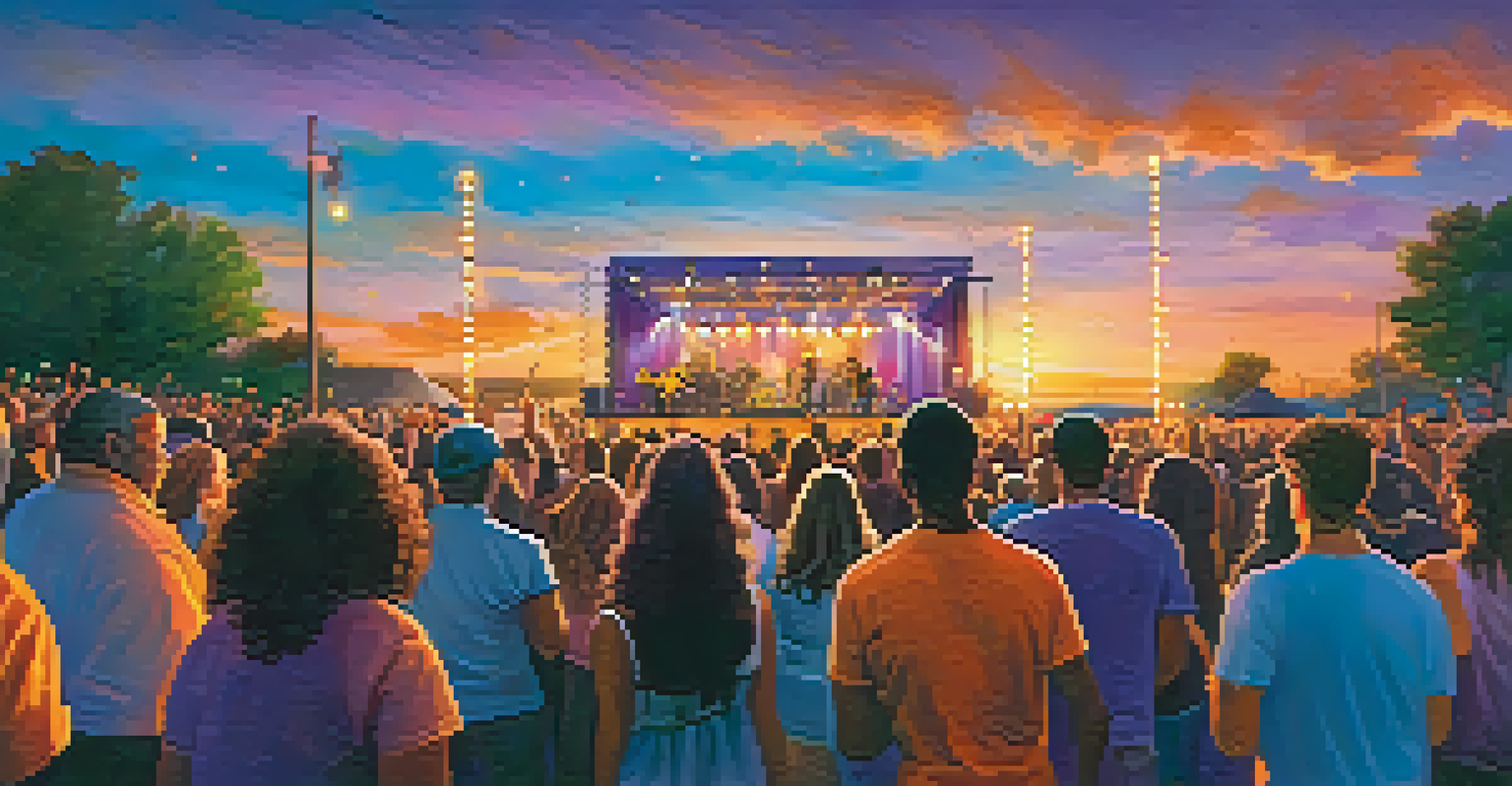How Music Triggers Memories in Childhood and Adolescence

The Science Behind Music and Memory Connections
Music has a unique ability to evoke memories, especially from childhood and adolescence. This connection is rooted in the brain's structure, where the hippocampus, responsible for memory formation, interacts closely with the auditory cortex. When we hear a familiar tune, it can trigger a cascade of memories and emotions linked to our past experiences.
Music can change the world because it can change people.
Studies have shown that music can enhance recall by providing cues that help us remember specific events or feelings. This is particularly true for songs that we associate with particular moments in our lives. For instance, hearing a song from your high school prom can transport you back to that night, complete with the laughter and excitement you experienced.
Moreover, the emotional responses triggered by music play a significant role in how we remember. When a song resonates emotionally, it strengthens the memory associated with it, making it more vivid and long-lasting. This emotional connection is why certain songs can instantly bring back a flood of memories from our formative years.
Childhood Memories: The Role of Familiar Tunes
During childhood, our brains are like sponges, absorbing everything around us, including the music we listen to. Nursery rhymes, lullabies, and children's songs often accompany important moments in our early years, creating a rich tapestry of sound linked to our experiences. These familiar tunes can evoke feelings of comfort and safety as they often remind us of our caregivers.

For example, hearing 'Twinkle, Twinkle, Little Star' may bring back memories of being rocked to sleep by a parent or grandparent. This association helps create a sense of nostalgia and can even influence our musical preferences later in life. The melodies we grow up with shape our emotional landscape and can evoke feelings of joy or security.
Music Evokes Powerful Memories
Music triggers memories by activating the brain's memory centers, making familiar tunes potent reminders of past experiences.
Furthermore, the repetition of these songs during childhood solidifies their connection to specific memories. Each time a child hears a familiar song, it reinforces the emotional ties, making it easier to recall moments from their past whenever that melody plays again. This is why childhood songs often hold a special place in our hearts long into adulthood.
Adolescence: The Soundtrack of Growing Up
As we transition into adolescence, the music we consume often becomes a defining part of our identity. Teenagers are known for their strong emotional connections to music, which plays a crucial role in shaping their social experiences and self-perception. This period is often marked by experiences like first crushes, heartbreaks, and friendships, all intimately linked to the songs of the time.
Where words fail, music speaks.
For instance, a breakup song may resonate deeply with a teenager, encapsulating their feelings and experiences in a way that words alone cannot. When they hear that song years later, it can evoke not only the pain of the breakup but also the lessons learned and the growth that followed. These associations create a rich emotional narrative that can last a lifetime.
Moreover, the communal aspect of music during adolescence—sharing playlists, attending concerts, or discussing favorite bands—further solidifies those memories. Music becomes a shared language that connects us with peers, deepening the emotional ties to the experiences we shared. This collective memory can make certain songs even more powerful triggers for recalling those formative years.
The Impact of Live Music on Memory Recall
Live music experiences have a profound impact on our memories, especially during childhood and adolescence. Attending a concert, school play, or community event creates a unique atmosphere that heightens emotional responses. These moments become etched in our minds, often accompanied by the sounds that filled the air.
For example, remember the excitement of your first concert? The energy of the crowd, the thrill of seeing your favorite band perform live, all contribute to a memorable experience that becomes tied to the songs performed. Years later, hearing one of those songs can instantly transport you back to that moment, reigniting the excitement and joy you felt.
Childhood Tunes Shape Identity
Songs from childhood create emotional connections that influence our musical preferences and evoke feelings of nostalgia.
Additionally, live music often fosters a sense of community and belonging. Whether it's a school event or a local concert, these gatherings create shared memories with friends and family. The bonds formed in those moments make the music associated with them even more significant, turning songs into lasting reminders of shared experiences and connections.
How Music Can Help with Emotional Healing
Music can also serve as a powerful tool for emotional healing, particularly for those reflecting on their childhood and adolescent experiences. For many, revisiting songs from their past can provide comfort during tough times, helping them process emotions and memories. This connection can be especially important during challenging life transitions.
For instance, a person going through a difficult breakup might find solace in songs that remind them of happier times. Listening to those familiar melodies can create a sense of nostalgia and help them navigate their feelings. This is because music often allows individuals to externalize emotions that may be hard to articulate.
Moreover, engaging with music from our past can facilitate conversations about our experiences. Sharing memories tied to songs can foster deeper connections with others, allowing us to feel understood and supported. In this way, music not only serves as a personal reflection tool but also as a means of building empathy and connection with those around us.
The Role of Technology in Music Memory Retrieval
In today's digital age, technology has transformed how we access and interact with music, making it easier to revisit our past. Streaming services and social media platforms allow us to create personalized playlists that serve as soundtracks to our memories. This accessibility means we can easily relive moments from our childhood and adolescence with just a few clicks.
For example, imagine creating a playlist of songs that defined your high school years. Each track can evoke specific memories, from friendships to important milestones. Sharing these playlists with friends can lead to nostalgic conversations, further enhancing the emotional connection to the music and the memories it triggers.
Live Music Fosters Lasting Bonds
Experiencing live music enhances memories by creating shared emotional moments, reinforcing connections with friends and family.
Additionally, algorithms that recommend songs based on our listening habits often introduce us to tracks we may have forgotten. Rediscovering these tunes can be a delightful surprise, reigniting memories we thought were lost. This blend of nostalgia and technology makes it easier than ever to maintain our connection to the music that shaped our formative years.
Preserving Memories Through Music in Later Life
As we age, the memories tied to music can become even more precious. Many people find themselves reminiscing about their childhood and adolescent experiences, often triggered by the songs they loved during those times. These musical memories can serve as a source of joy and comfort, helping to maintain a sense of identity.
For instance, older adults may find joy in listening to music from their youth, which can evoke fond memories of family gatherings, friendships, and life events. This connection to the past can enhance their overall well-being, providing an emotional anchor as they navigate the challenges of aging. Music often serves as a bridge to those cherished moments, keeping them alive.

Furthermore, engaging with music can foster intergenerational connections. Sharing songs and stories with younger family members can create a rich tapestry of memories that span generations. This not only preserves the music's legacy but also strengthens family bonds, ensuring that those memories continue to resonate across time.